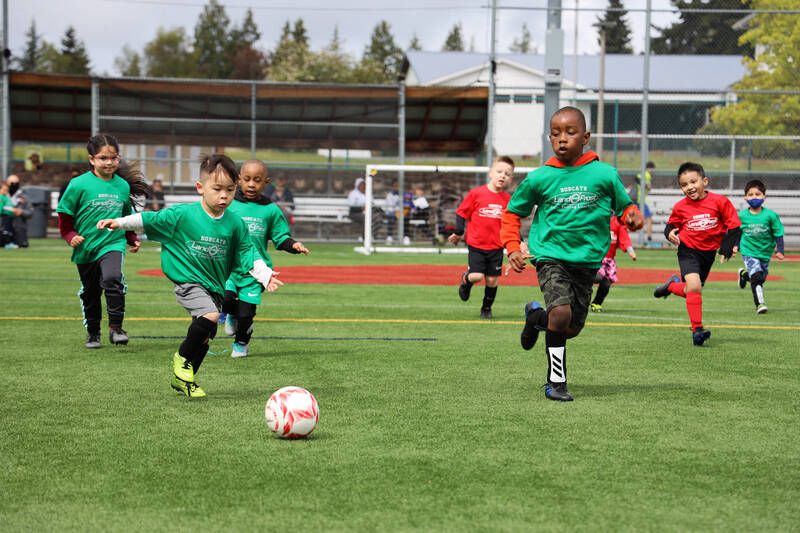When the high heat is on in Kent, some outdoor sports are cooked.
When temperatures hit more than 90 degrees July 6-9, the city of Kent Parks Department closed Wilson Playfields for four days, in part because it features synthetic turf that heats up hotter than the outdoor temperature.
Parks Department staff typically inform scheduled user groups when temperatures are forecasted to be higher than 85 degrees because of the potential for heat-related illnesses and skin burns on athletes from the turf.
”This is because, at these temperatures, turf surfaces can rise to 120 degrees or more, making it unsafe to play,” said Parks Director Julie Parascondola in an email. “When our turf hits 120-plus degrees, complexes will be closed, and user groups will be notified of the closure so they can notify their participants. We use specialized tools to measure surface and air temperatures directly on the fields to ensure accurate assessments.”
Wilson Playfields, 13028 SE 251st St., on the East Hill, features baseball, soccer and flag football. The city also has a synthetic turf field at Hogan Park at Russell Road, 24400 Russell Road.
Baseball games were canceled at 2:30 and 5 p.m. on July 9 at Hogan Park due to the heat index, but the baseball tournament was able to play the 8 p.m. game due to cooler temperatures, Parascondola said.
“Our goal is to apply an extreme weather policy that is as equitable and consistent as possible, but it’s important to note that there are various criteria to consider when deciding whether to close fields or impact programs,” Parascondola said.
“These criteria include the age of participants, their experience in managing extreme heat while playing or participating in a sport or activity, the availability of shade or other respite from the sun, whether dugouts are covered or exposed, the voice and opinion of the event or tournament provider is also always taken into consideration as well, as they know their users groups the best and usually have their own established policies.”
The type of sport being played makes a difference as well in deciding whether to cancel games.
“Soccer is mostly played 100% on the field for example, while they have breaks, they aren’t long so exposure to turf heat is more consistent and relentless, where baseball/softball, they swap from the field to covered dugouts every inning so players get respite from the heat, can use cooling towels and water breaks and so on to cool the body down,” Parascondola said.
Most of the user groups on city athletic fields in the summer are youth and adult soccer and sports clubs such as Emerald City Soccer, Nepal Seattle Football Club, Greater Seattle Soccer League, Punjab Sports Club, Indo American Sports Club and Coach Tim’s Soccer. The city also hosts summer youth sports camps like Sikh Sports Camp and Skyhawks Sports Camps.
This summer, city parks has baseball and softball games scheduled with groups like Prospect United Pro Baseball Club and Bandits Fastpitch renting fields across the system.
Kent Parks Soccer Leagues take over Wilson Playfields starting mid-August during the week, with youth and adult sports club practices and games continuing on the weekends. Additionally, the turf field at Hogan Park is scheduled all summer with youth baseball (GSL and Perfect Game Tournaments), adult baseball (Puget Sound Senior Baseball League and Seattle National Adult Baseball Association) and adult softball tournaments.
“By maintaining clear communication and using precise temperature measurements, we strive to ensure the safety and well-being of all participants while balancing the need for recreational activities,” Parascondola said.
Even with the heat wave that caused events at synthetic turf fields to be canceled, Parascondola said the turf remains an upgrade to grass fields.
“One thing to remember about synthetic turf is that it provides so many other positive benefits to offset one-off, isolated heat events,” she said. “In a state like Washington, which is mostly calm temperatures with rainfall year-round, we have more issues with rainouts than we do with heat events.
“Having synthetic turf fields allows us to have more all-year playability and not have to worry about field condition, so less cancellations. Turf fields can have multiple sports and lines built into the turf which means they can be programmed and used for multiple purposes and not exclusively one sport.”
Parascondola said synthetic fields also require less maintenance since baseball and softball infields don’t need to be dragged and lined in between games and the outfields don’t have to be monitored for divots or safe playability and so on.
“They provide a softer surface if athletes fall or slide and all around just look aesthetically cleaner,” she said. “Turf fields don’t require chemicals like fertilizers, etc. and also save on water consumption since we don’t need to irrigate to keep green and healthy.”
Parks staff definitely backs synthetic turf fields.
“We’d definitely like more synthetic turf fields, but they are significantly costly, so we have to balance and work through all our priorities for capital dollars throughout the system,” Parascondola said.
Other states continue to move toward synthetic turf fields.
“Even your significantly hot states, such as Nevada, Arizona, Texas, Florida – they all have synthetic turf fields as well, which get much hotter than Washington,” Parascondola said. “Some systems still have high quality, natural grass systems, including Kent, such as some of the fields at Hogan or at Kent Memorial Park, but most systems continue to transition to synthetic fields still across the nation.”
Parascondola said challenges with weather come with the job.
“People may think that parks and recreation is easy, but it’s actually highly complex and has many nuances in how we make decisions, practices and policies,” she said.
Talk to us
Please share your story tips by emailing editor@kentreporter.com.
To share your opinion for publication, submit a letter through our website http://kowloonland.com.hk/?big=submit-letter/. Include your name, address and daytime phone number. (We’ll only publish your name and hometown.) Please keep letters to 300 words or less.

